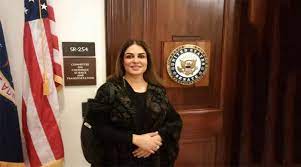By Farhan Qutab Siddiqui
Numaira Saleem is known for all the good reasons which are enough to make Pakistan proud. She is the first Pakistani who hoisted Pakistani flag at the North and South Poles, first Asian to skydive (tandem) Mount Everest, during First Everest Skydive in 2008. Numaira has officially been recognized as the First Pakistani Astronaut by the government of Pakistan in 2006. In 2007, Numaira served as Honorary Ambassador of Tourism for Pakistan. And now she is going to be the first Pakistani ever who will hoist Pakistani flag in space. She is often referred to as the “Collector of Firsts” for all these reasons.
This woman is the best example of Women empowerment which is a concept that has gained immense significance in recent decades. It refers to the process of enabling women to have control over their lives, make choices, and access opportunities in various spheres of society. This concept is not just about promoting gender equality but also about recognizing and harnessing the potential of women to contribute to the development and progress of their communities and the world at large.
One of the key facets of women empowerment is economic empowerment. When women have access to education, job opportunities, and financial resources, they can become self-reliant and contribute to their family’s income. This not only enhances their self-esteem but also improves the overall economic well-being of their households. Studies have shown that societies that empower women economically tend to have lower poverty rates and higher economic growth.
Education is a powerful tool for women’s empowerment. When girls and women are educated, they are better equipped to make informed decisions about their lives, health, and families. They can choose their own career paths like Numaira Saleem.
Education also opens doors to a wider range of career opportunities and helps women become more financially independent.
Moreover, educated women are more likely to participate in civic and political activities, thus influencing policies and decisions that impact their communities.
Political empowerment of women is crucial for ensuring their voices are heard in decision-making processes. When women are represented in political offices, they advocate for policies that address gender-based inequalities and social issues. This can lead to more equitable and just societies. Countries that have greater female political representation often exhibit better governance and policies that promote the welfare of all citizens.
Empowering women also involves challenging traditional gender roles and stereotypes that limit their potential. Numaira Saleem is also basically challenging gender stereotypes and doing all the big things that are usually not expected from women specially in our culture. So,it is important to create a society where women are not confined to predefined roles but are free to pursue their interests and ambitions without fear of discrimination or judgment. This cultural shift can lead to a more inclusive and diverse society where everyone can thrive. We need more brave women like Numaira Saleem who are able to show their potential fearlessly.
“Women Empowerment” is not just a buzzword; it is a concept that has the potential to transform societies and make the world a better place for all. When women are empowered, they can contribute to economic growth, foster healthier communities, and shape policies that benefit everyone. However, achieving women empowerment is an ongoing process that requires the collective effort of individuals, communities, governments, and organizations. It is a vision for a brighter and more equitable future where the full potential of women is realized and we see more women like Numaira Saleem on the front stage.




